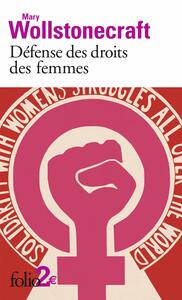You need to sign in or sign up before continuing.
Take a photo of a barcode or cover
challenging
informative
inspiring
reflective
medium-paced
Me pareció un gran libro, un escrito que nos hace reflexionar sobre la posición de la mujer en la actualidad y como en muchos aspectos tras más de 200 años de diferencia, su figura sigue siendo en profundidad la misma.
Da qué pensar sobre la educación igualitaria, que no se lleva a cabo; y no me refiero a la escuela, si no de la estructura social que estamos impartiendo y que se nos impartió.
Da qué pensar sobre la educación igualitaria, que no se lleva a cabo; y no me refiero a la escuela, si no de la estructura social que estamos impartiendo y que se nos impartió.
informative
slow-paced
challenging
informative
slow-paced
informative
fast-paced
Se trata de una obra muy, muy contextual. Es cierto que algunas de sus reivindicaciones, como la fal de sororidad, son aplicables a día de hoy, pero la mayoría son dirigidas a damas de clase media -y aplicables a la alta a pesar de la autora.
challenging
funny
informative
reflective
slow-paced
Definitely something worth reading. Mary Wollstonecraft preaches gender equality, but it is through the lens of an upper-class woman in 18th-century white European society. Her takes on society of the time are privileged and not applicable to every woman, but many of her statements are still true today. Virtue cannot be expected of women until they are independent of men, yes, but do not blame women for their behaviors that are expected and influenced by men. She writes with such passion on the subject and such disdain for the men of the time (particularly Rousseau), her powerful voice is something worth reading today and taking into consideration with modern day activism.
An energetic attack on Jean-Jacques Rousseau's influential and often quite sexist opinions. The author reflects afterwards, "I shall give the last page to the printer today; and, I am dissatisfied with myself for not having done justice to the subject. - Do not suspect me of false modesty -- I mean to say that had I allowed myself more time I could have written a better book." I am inclined to agree with her. Side note: Mary Wollstonecraft is not to be confused with Mary Wollstonecraft Shelley, who wrote [b:Frankenstein: The 1818 Text|35031085|Frankenstein The 1818 Text|Mary Wollstonecraft Shelley|https://i.gr-assets.com/images/S/compressed.photo.goodreads.com/books/1498841231l/35031085._SY75_.jpg|4836639]. The second is the daughter of the first.
It's definitely a vital book to read to understand just how far we've come since then, but it certainly took a while.
There are many important themes that Wollstonecraft discusses that are incredibly interesting to read and apply to modern times, issues that are still prevalent in today's societies, especially that of weaponised beauty standards, which really hurt to read about.
The one thing I didn't like is that it's very repetitive - there's a set of 4-5 arguments that seem to go on forever, and in unexpectedly flowery language (which I do appreciate, but it's funny to hear Wollstonecraft say that she will be straight to the point and then go on to become the pre-Tolkien).
There are many important themes that Wollstonecraft discusses that are incredibly interesting to read and apply to modern times, issues that are still prevalent in today's societies, especially that of weaponised beauty standards, which really hurt to read about.
The one thing I didn't like is that it's very repetitive - there's a set of 4-5 arguments that seem to go on forever, and in unexpectedly flowery language (which I do appreciate, but it's funny to hear Wollstonecraft say that she will be straight to the point and then go on to become the pre-Tolkien).
I can recognize the importance of this writing at the time and also it was too much for me to absorb.
challenging
informative
inspiring
reflective
fast-paced
Written in the late 1790's... Life and language is very different than when this was written. I still wanted to read it, as the first feminist manifesto, but lacking the context of what life was like then, I struggled a bit.
Additionally, the author's ideas about how life should change for women were based on and directed toward a narrow subset of women - upper class Englishwomen. Not the nobility, not the merchant or working class, nor the poor.
She seemed to have a deep loathing of Rousseau, who took up considerable space in this work despite having been dead a decade or two. It felt like she both despised women who were frivolous and too much occupied with dress and outward appearance, while simultaneously pitying them because, what else did they have to do? She also had harsh words for libertines.
I found it interesting that she barely touched on something we consider a basic right, in the last century, the right to vote (and serve in public office). Possibly that felt like a bridge too far to argue for, in that era. I am glad I read it, because classic, but can't say I really *enjoyed* it. What I missed in it was even a hint of humor.
Additionally, the author's ideas about how life should change for women were based on and directed toward a narrow subset of women - upper class Englishwomen. Not the nobility, not the merchant or working class, nor the poor.
She seemed to have a deep loathing of Rousseau, who took up considerable space in this work despite having been dead a decade or two. It felt like she both despised women who were frivolous and too much occupied with dress and outward appearance, while simultaneously pitying them because, what else did they have to do? She also had harsh words for libertines.
I found it interesting that she barely touched on something we consider a basic right, in the last century, the right to vote (and serve in public office). Possibly that felt like a bridge too far to argue for, in that era. I am glad I read it, because classic, but can't say I really *enjoyed* it. What I missed in it was even a hint of humor.






